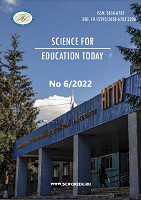Основные тенденции и приоритеты в исследованиях когнитивных и некогнитивных предикторов академической успешности в России и за рубежом
Main trends and priorities in Russian and international studies on cognitive and non-cognitive predictors of academic success
Author(s): N. V. Fedina, R. A. Dormidontov, V. K. EliseevSubject(s): Higher Education , State/Government and Education, Social development, Sociology of Culture, Sociology of Education
Published by: Новосибирский государственный педагогический университет
Keywords: Predicting academic success; Predictors of academic success; Cognitive predictors; Non-cognitive predictors; Personality predictors; Predictors of social influence;
Summary/Abstract: Introduction. The article addresses the problem of predicting students’ academic success. The purpose of the article is to identify the main trends and priorities in Russian and international research on cognitive and non-cognitive predictors of academic success. Materials and Methods. As a methodological basis for the scientific analysis, systemic and action-oriented approaches are used, which make it possible to consider various concepts of this problem in the light of social changes in the development of society and educational systems. The research methods used in this study include analysis of scholarly literature, comparison, clarification, synthesis of outcomes and generalization. Results. The authors summarize and present trends and priorities in examining a group of predictors underlying academic success in Russian and international psychological and educational research over the past decade. The main research results consist in identifying the vector of the shift in emphasis in the studies of Russian and foreign scientists towards the priority of investigating noncognitive predictors of the academic success of students. It has been revealed that over the past decade, non-cognitive predictors of influence at different levels have increasingly become the topic of studies by Russian and international researchers: social (level of social adjustment of students), socio-economic (socio-economic status of the family, socioeconomic composition of the school), socio-psychological (school climate), personal (attitudes and positions of parents and teachers), etc. Acknowledgments The study was financially supported by the Ministry of Education of the Russian Federation by a state assignment. Project No. 073-03-2022-017 dated June 01, 2022 (“The study of predictors of success in coping with the educational program by students at high risk of school failure”). Conclusions. The level of development of society and the educational system inevitably adjusts the influence of factors (predictors) that determine the academic success of students. It has been revealed that currently the main trend and priority direction of Russian and international psychological and educational research are non-cognitive predictors: personal predictors and predictors of social influence at the macro and micro levels.
Journal: Science for Education Today
- Issue Year: 12/2022
- Issue No: 6
- Page Range: 7-31
- Page Count: 25
- Language: Russian

